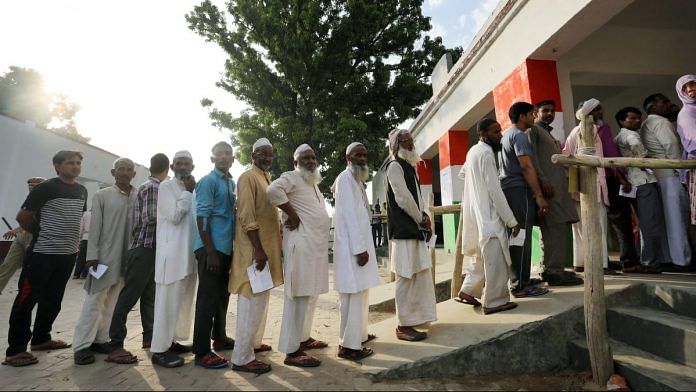ThoughtShot—The best of the day’s opinion, chosen and curated by ThePrint’s top editors.
What goes UP
Ashutosh Varshney | Sol Goldman Professor of international studies and the social sciences at Brown University
The Indian Express
Varshney identifies factors that could determine the results in Uttar Pradesh. He finds no “wave” in favour of Modi, rather two ‘sub waves’ — one for the BJP comprising the upper castes and the other for the SP-BSP-RLD’s mahagathbandhan of Dalits-Muslims-Yadavs.
Besides the arithmetic of the two groups there are “four factors” that will determine the results.
First, the non-BJP vote is “not entirely split” as in 2014. Second, if a party’s base “is not evenly spread, its results can be better”, such as Muslims accounting for 30 per cent of voters in many seats. Third, the Congress’s candidates could eat into the BJP’s share of voter groups like Brahmins. And fourth, turnout is critical: A low turn-out, typically, helps parties with a strong lower-caste base.
Not speaking truth to power has cost us dearly
Praveen Chakravarty | Chairman of Congress’s data analytics department
Hindustan Times
In Modi’s “cloud cover” remark on the Balakot air strikes, Chakravarty says his ignorance of military matters is “not the issue”. The “silence” from military officials or other experts was “the main crime”. Similarly, had anyone told Modi in the PMO meeting on demonetisation that he was making an error, that “disaster” would have been averted.
The lack of “candid feedback” by officials led to “another economic hara-kiri” in GST, and after its launch, no “corporate honchos” were honest to “speak truth to power” either about the ill-effects. According to Chakravarty, the executive and civil groups in a democracy share a “moral obligation” to speak truth to power to shed the “cloud cover syndrome”.
A triumph of force
Swapan Dasgupta | Journalist and MP
The Telegraph
Dasgupta says the violence in West Bengal this election season, between TMC and BJP supporters, has its roots in similar incidents in the 1960s and 70s when the Congress was facing stiff competition from the Left (CPI and Naxalites). The single most important lesson from the 1972-1977 period was that “once political violence takes root, it becomes a part of the political culture”.
His “rough guess” is that due to electoral malpractices, the TMC vote has been “unfairly” boosted by anything between 3-5 per cent. Now with an “evolving Hindu identity” and a positive opinion about Modi over the Balakot incident, the TMC’s monopoly over aggression could soon face retaliation from the BJP’s growing presence.
Why the Muslim vote matters in UP
Zoya Hasan | Professor emerita, Jawaharlal Nehru University
Mannika Chopra | Managing editor, social change, Council for Social Development
The Hindu
Hasan and Chopra say the Muslim vote in UP will be decisive in the 2019 elections. The community’s is determined to defeat the BJP for its Hindutva politics under CM Yogi Adityanath and “the politics of hate” against Muslims. These force them to prioritise security of life and property, so much so that even the elite and upper-middle class Muslim families who historically sided with the Congress in Lucknow have decided to vote for the mahagathbandhan as it will compete better against the BJP. Voting is the “weapon of the weak” and the Muslims want to capitalise on their vote to convey that they still count in India’s democracy.
Rate cuts and ‘pliant’ governors
Soumya Kanti Ghosh | Group chief economic advisor, State Bank of India
Business Standard
Ghosh counters a comment in The Economist magazine that said the “Indian government has replaced a capable central bank chief with a pliant insider who has cut rates ahead of an election”. He argues that the rate cuts in February and April by the monetary policy committee, of which the RBI governor is a member, were based on “hard data-driven evidence” and taken against the backdrop of “pliant macroeconomic conditions”. He wonders if another rate cut in the June monetary policy in view of a faltering growth and weak inflation will be interpreted by The Economist as a post-election gift to the new government.
Seven likely outcomes of the ongoing US-China trade war
Ajay Srivastava | Additional director general, foreign trade, Ministry of Commerce
Mint
What will be the likely outcomes of the US-China trade war and what will it mean for India? Srivastava thinks the escalating tensions may harm both the US and China and reshape trade flows. This may be “unsettling” for most countries but will also spell a trade opportunity for India.
He argues that the tariff war is unlikely to bring manufacturing back to the US, while labour-intensive production could shift out of China because a 25 per cent tariff and increasing wage rates could reduce the competitiveness of Chinese exports, which would move to other countries, including India.
Remember this iconic iconoclast
Abhijit Gupta | Professor, Department of English, Jadavpur University
Economic Times
Gupta recalls Ishwar Chandra Vidyasagar as a social and educational reformer. Vidyasagar is credited for his efforts to make widow remarriage acceptable, and for the eventual passage of the Widow Remarriage Act in 1856 in Bengal.
He also brought in major educational reforms, including a class routine and weekly off day, and authored textbooks on the Bengali alphabet and Sanskrit grammar.
Gupta writes that Vidyasagar is also credited for standardising Bengali orthography and typography. He adds that if there is a silver lining from the incident earlier this week, it is that people of today have got reminded about Vidyasagar’s efforts to modernise and his radical interventions on behalf of women.



